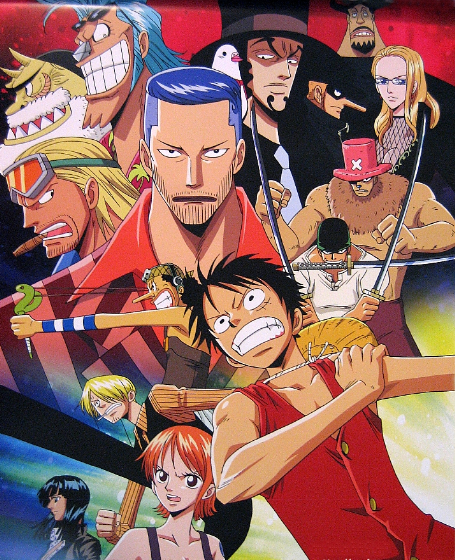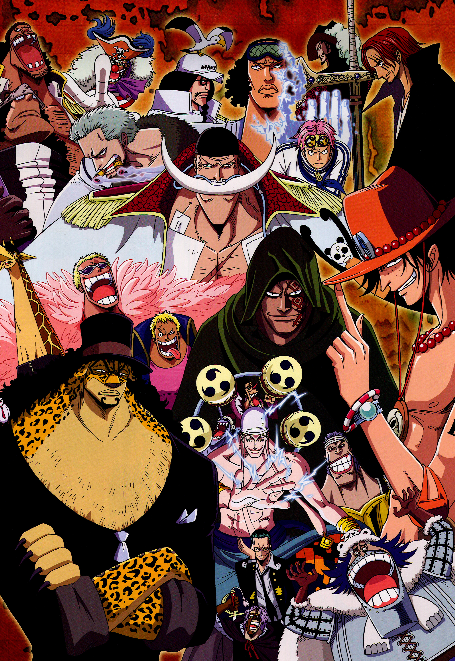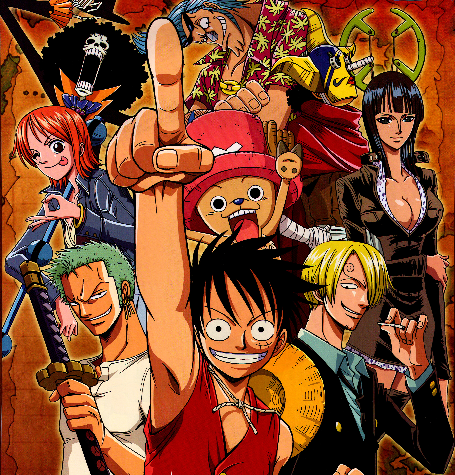
As I’m making my way through the concluding episodes of the Enies Lobby arc of One Piece, I’m continually intrigued by the series’ reoccurring theme of “rebelling against authority,” particularly how the heroes of the show are pirates, and the villains are often the Marines or other authoritative figures…
Corrupted governments, politics, and authoritative institutions are definitely not uncommon sources of antagonism in anime. One Piece, however, stands out first of all because it’s one of the most popular, if not the most popular, shounen anime/manga currently running in Japan. Everyone in Japan has heard of One Piece. And although the most dedicated One Piece fans are probably older, the series is marketed as children/family entertainment, so most kids in Japan have seen or read One Piece at some point and have obviously been exposed to its themes of rebelling against authoritative injustice.
The first thing to note about One Piece when it comes to this topic is that the heroes of the show are pirates, at least that’s what authority has labeled them. The word “pirate” both in Japanese and English conjures up negative images of those who disrupt peace, steal, plunder, and perhaps kill out of greed. Luffy and his Straw Hat crew however, have created a whole new identity for pirates that has probably never been explored in any other medium. Rather than complying with the traditional image of pirates, the Straw Hats are the ones we are rooting for in the series. During their journey, they encounter all manner of small and large-scale injustices and oppression. And, rather than ignore or take advantage of them, they often put their own well-being on the line to passionately stamp out these injustices, usually without any desire for a reward (double the effort if the one threatened is one of their own Straw Hat comrades). Each of them has a distinct, appealing personality, with their own realistic inner struggles and personality quirks. But they are united by a strong sense of honor, morality, a dislike for injustice, and unfaltering loyalty towards one another.
So, if the Straw Hats are such good people, why are they branded as pirates with bounties on their heads, persecuted by the Marines, and thus have to rebel against authoritative figures in order to ensure their safety and freedom? It is because the Marines, the World Government, or some other authoritative person or institution with power, are the ones who create the majority of antagonism in the series, out of greed, selfishness, or a lust for power – reasons not too unlike those in reality. But rather than embrace these injustices simply because someone with authority and power has proclaimed them, the Straw Hats’ morals and honor, attributes we should but don’t see in the government, won’t allow them to just do nothing about it. And so they rebel and fight against authority, and as a result become wanted by the World Government and endlessly pursued by the Marines.
Another reason the heroes of One Piece are labeled as criminals by the government is because some of them have strange powers and extraordinary physical strengths, courtesy of the Devil Fruits that exist in the series. Rather than look at the merits of the individual, the World Government persecutes any Devil Fruit user that might be a threat to their authority, despite the fact that some governmental figures are Devil Fruit users themselves.

The above image shows just about all the major antagonistic characters in One Piece. With the exception of a few who are pirates themselves (of the more traditional “bad” breed), most of these characters are some kind of authoritative, governmental, or higher-up “respected” figure. And, despite the mask that their societal status makes for them, a number of these guys are the most brutal, ruthless, uncaring villains you’ll ever see.
The Enies Lobby arc of One Piece is a prime example of this subject, starting back with the Buster Call at Ohara, when the government decided to destroy Ohara and all the people who lived there simply because the historical truth that the people discovered clashed with their own authoritative interests. Robin was unjustly condemned as a criminal because of her connection to the truth of Ohara and her Devil Fruit ability. Eventually Robin finds herself being dragged through the so-called “Gate of Justice” by the so-called governmental “hero,” Spandam, credited with capturing this so-called “dangerous criminal.” Despite numerous hardships and battling with the government’s powerful and nasty fighters, the CP9, Luffy and the others never give up on rescuing her. There’s a dramatic scene where the Straw Hats finally find Robin and Spandam in the tower and, upon Luffy’s command, Sogeking sets fire to the World Government’s official flag with his sling shot in a show of utmost rebellion and defiance. Spandam tells them that such an act is declaring war on the entire government, if not the entire world. But of course, the Straw Hats couldn’t care less about what the world thinks of them; all they want is to get their unjustly accused friend back.
It’s hard to believe that a show with such underlying themes, and often times intense blood and violence, is a beloved children/family show in Japan. Obviously it stems from the differing ideas in Japan and the West about what is acceptable for children to watch. But I feel that One Piece offers a number of good moral messages. One is obviously not to judge people by the label authority has given them. Although the Straw Hats are called pirates and criminals by the government, anyone familiar with the series knows that they are heroes and should be seen as the benevolent individuals that they are, despite their label as “pirates.” This leads to another message of not always trusting the government or bowing down to authority. Just like the Straw Hats, if someone or some institution is executing an injustice, no matter who they are or how much power they have, someone needs to take a stand against them.

Corrupt governmental authority, and the heroes, branded as criminals, who were brave enough to fight against the injustice even at the sacrifice of their own comfort, is something that has been going on throughout history, and continues to this day. And unfortunately, creeps like Spandam really exist. I can’t help but think that One Piece creator Eiichiro Oda is trying to tell us something about the societal situation in reality by making the so-called “criminals” the heroes of his story, and the authority figures the villains. Japanese people are known for being submissive and not fighting against authority, so maybe Oda is trying to help change this in his own way. If only American cartoons had these kinds of thought-provoking, universal messages too. But however you interpret it, the Straw Hats will always be the best group of heroes to me! ^_^ It’s too bad courageous, reliable, self-sacrificing people like them are hard to come by in the real world.
Keep up the good work, an inspiering text, and for you that haven’t seen or read One Piece, what are you loafing about here for, get yourself together and do it!
I really liked what you wrote in your blog. You made a lot of good points and I also liked how you pointed out the “rebelling against authority” theme.
It makes me realise that One Piece is really under-appreciated outside of Japan. :(
Saddam,Bush, Hitler,Stalin,Pharaoh,Castro,Mugabe,Ahmedinejad, just to name a few are in authority but are evil.The bible says that when the righteous are in authority the people rejoice, but when the wicked beareth rule the people mourn.
how fabolous!!!
this is the real adventorous anime and history in the whole new anime!!
plz continues the excitement!!!
i liked your review it was great, i didnt think that One Piece would be the most popular anime in japan but then again im not surprised either. this anime tells it how it is, the government is corrupt lol >_>